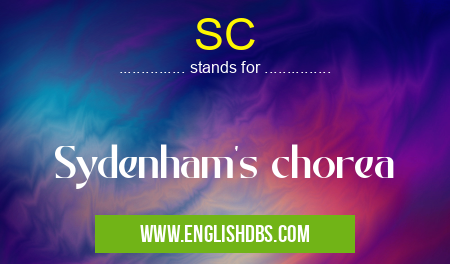What does SC mean in THERAPEUTICS
SC stands for Sydenham's chorea, also known as chorea minor or St. Vitus' dance. It is a neurological disorder characterized by involuntary, purposeless movements that primarily affect the face, limbs, and trunk. SC is commonly associated with rheumatic fever, a post-infectious autoimmune condition triggered by an untreated streptococcal infection.

SC meaning in Therapeutics in Medical
SC mostly used in an acronym Therapeutics in Category Medical that means Sydenham's chorea
Shorthand: SC,
Full Form: Sydenham's chorea
For more information of "Sydenham's chorea", see the section below.
» Medical » Therapeutics
Etiology
SC is caused by an inflammatory process in the brain, specifically in the basal ganglia. The underlying mechanism involves the body's autoimmune response to the streptococcal infection, which mistakenly targets the brain tissue. This inflammation leads to impaired neuronal function and abnormal muscle contractions.
Symptoms
The hallmark symptom of SC is chorea, which refers to the involuntary, irregular, and purposeless movements. These movements can range from mild tics to severe, disabling spasms. Other symptoms may include:
- Motor abnormalities: Weakness, clumsiness, difficulty with fine motor skills, and writing or drawing
- Emotional lability: Mood swings, irritability, and difficulty concentrating
- Behavioral problems: Impulsivity, distractibility, and decreased school performance
- Speech difficulties: Slurred speech or difficulty speaking clearly
Diagnosis
The diagnosis of SC is based on a thorough medical history and physical examination. Doctors typically look for evidence of rheumatic fever, such as a recent streptococcal infection, heart murmurs, or joint pain. Other diagnostic tests may include:
- Electroencephalography (EEG): To detect abnormal brain activity
- Magnetic resonance imaging (MRI): To visualize the brain and rule out other neurological disorders
Treatment
The primary goal of SC treatment is to reduce inflammation and improve symptoms. This typically involves:
- Anti-inflammatory medications: To suppress the autoimmune response
- Anticonvulsants: To control the involuntary movements
- Physical and occupational therapy: To strengthen muscles and improve coordination
Essential Questions and Answers on Sydenham's chorea in "MEDICAL»THERAPEUTICS"
What is Sydenham's chorea (SC)?
Sydenham's chorea (SC) is a neurological disorder that affects children and young adults. It is characterized by involuntary, purposeless movements of the limbs, face, and trunk. SC is caused by a bacterial infection, usually a streptococcal infection, and is often associated with rheumatic fever.
What are the symptoms of SC?
The symptoms of SC can vary in severity and may include:
- Involuntary, jerky movements of the limbs, face, and trunk
- Difficulty with coordination and balance
- Muscle weakness
- Speech difficulties
- Emotional lability
- Fatigue
What causes SC?
SC is caused by a bacterial infection, usually a streptococcal infection. The bacteria produce toxins that attack the brain, causing inflammation and damage to the basal ganglia, which are responsible for controlling movement.
How is SC diagnosed?
SC is diagnosed based on a physical examination and a patient's medical history. Blood tests may be performed to check for signs of a streptococcal infection. In some cases, imaging tests such as an MRI or CT scan may be ordered to rule out other conditions.
How is SC treated?
Treatment for SC typically involves antibiotics to clear the streptococcal infection and anti-inflammatory medications to reduce inflammation in the brain. In severe cases, corticosteroids or other immunosuppressive drugs may be prescribed. Physical therapy and occupational therapy may also be helpful in improving coordination and balance.
What is the prognosis for SC?
The prognosis for SC is generally good. Most patients recover completely within a few months. However, some patients may experience long-term neurological problems, such as difficulty with coordination or balance.
Final Words: SC is a neurological disorder characterized by involuntary movements and other neurological symptoms. It is commonly associated with rheumatic fever and is caused by an autoimmune response to a streptococcal infection. Treatment focuses on reducing inflammation and alleviating symptoms. With proper management, most cases of SC resolve within a few months to a year.
SC also stands for: |
|
| All stands for SC |
